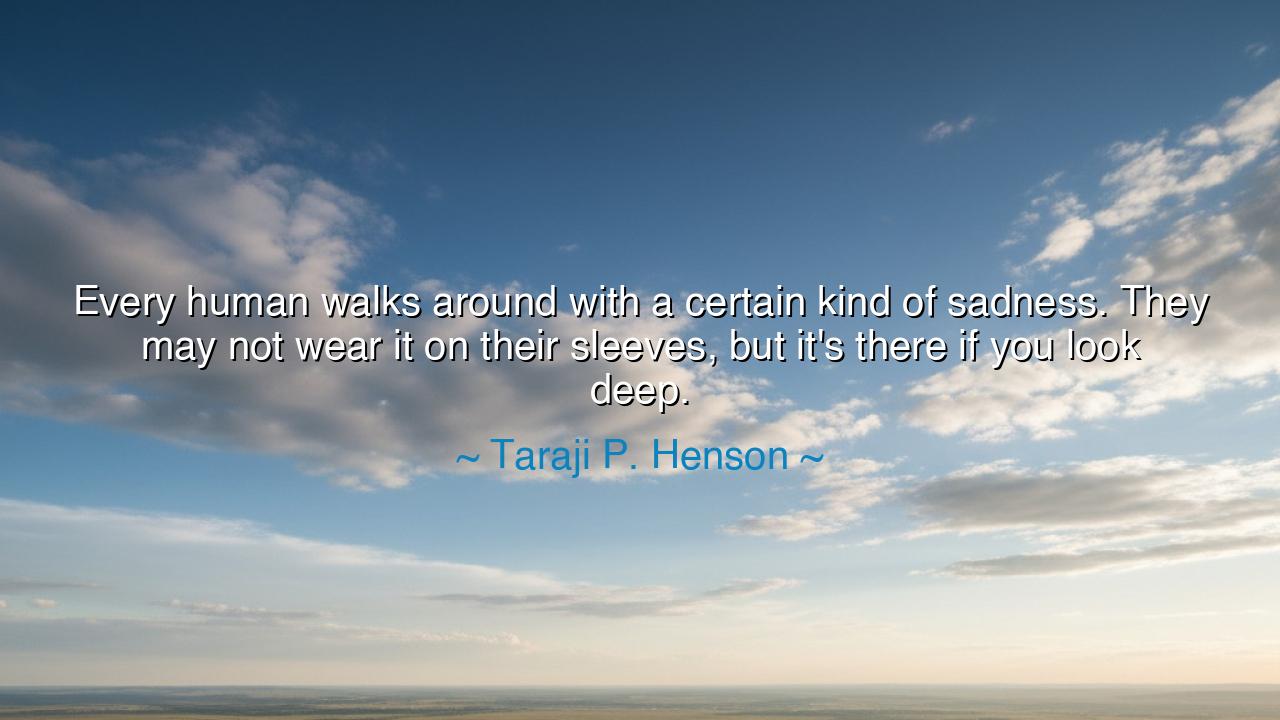
Every human walks around with a certain kind of sadness. They may
Every human walks around with a certain kind of sadness. They may not wear it on their sleeves, but it's there if you look deep.






The wise and soulful Taraji P. Henson, whose voice often carries both power and tenderness, once said: “Every human walks around with a certain kind of sadness. They may not wear it on their sleeves, but it's there if you look deep.” These words, spoken from the depths of experience, reveal a truth as old as humankind itself—the truth that sorrow is universal, that beneath every smile and every act of strength, there exists a quiet ache, a burden known only to the heart that bears it. This is not a message of despair, but of understanding. It calls us to see one another not with judgment, but with compassion; not with haste, but with empathy.
The origin of this quote is not born from philosophy alone, but from a life lived in both light and shadow. Taraji P. Henson, an actress celebrated for her strength and authenticity, has often spoken about her struggles with loss, heartbreak, and the hidden battles that accompany success. She has faced the grief of losing loved ones, the weight of single motherhood, and the silent wars that come with perseverance. Through these experiences, she came to understand what many forget: that the human heart, no matter how radiant or joyful it appears, carries within it a reservoir of unspoken pain. Her words remind us that even the strongest souls have scars, and that behind every face is a story waiting to be honored.
This truth is not new—it is the same truth spoken by the sages and poets of old. The Greek tragedians wrote of it when they showed heroes brought low not by weakness, but by the tragic burden of being human. The Buddha taught it when he declared that “life is suffering,” not to condemn life, but to teach compassion for all who live it. And the poet Saadi of Shiraz—whose verses once echoed through Persian courts—wrote that “Human beings are like the limbs of one body; if one limb is afflicted with pain, the others cannot remain at rest.” To see sadness in others, then, is not to pity them, but to recognize that we share the same wound, that our humanity itself is the bond of our sorrow and our strength.
We can find this truth, too, in the lives of the great. Consider Abraham Lincoln, the liberator of a nation, whose face, carved in marble, bears the shadow of melancholy. Behind his leadership lay a heart heavy with grief—the loss of children, the division of his country, the loneliness of power. Those who met him often spoke of his kindness, his patience, and his deep empathy; and perhaps it was precisely because of his own sorrow that he could feel so deeply for others. Like Taraji’s words, his life reminds us that sadness does not weaken us—it refines us. It deepens the well of compassion within the soul and teaches us to see beyond appearances into the truth of another’s heart.
When Taraji says that “they may not wear it on their sleeves,” she speaks to the hiddenness of pain in the modern world. Many walk with unspoken grief—masked by laughter, buried beneath ambition, or numbed by distraction. Yet if we look deeply, as she urges us to do, we will find that everyone carries something unseen: the quiet mourning of lost dreams, the ache of love unreturned, the sorrow of feeling unseen or misunderstood. To see this truth in others is an act of grace. It softens our hearts, silences our harshness, and teaches us to tread gently, for we are walking among wounded souls.
But let this not be a call to sadness alone. For within this shared sorrow lies also the possibility of healing. When we understand that every heart is burdened, we begin to build a world of gentleness instead of cruelty, patience instead of scorn. We learn to listen more deeply, to forgive more freely, to reach out rather than turn away. The ancient philosophers said that “to know oneself is to know all mankind.” So too, when we acknowledge our own sadness, we become better equipped to recognize and honor the pain in others. In this way, sorrow becomes not a barrier, but a bridge.
The lesson in Taraji P. Henson’s words is this: look deeper. Do not take a smile at face value, nor dismiss a quiet spirit as cold. Every person you meet carries a story, a battle, a loss that has shaped them. If you would live wisely, approach each soul with reverence. Be kind when it is difficult; be patient when it is undeserved. Your gentleness may be the one balm that eases a burden you cannot see. And when your own sadness feels heavy, remember that you are not alone—you are part of the great human family, bound together by both suffering and love.
So, my child, remember the truth of Taraji’s wisdom: “Every human walks around with a certain kind of sadness.” Do not flee from it, in yourself or in others. Instead, let it teach you tenderness. Let it deepen your spirit. For in the quiet sadness we all share, there lives the potential for our greatest virtue—compassion—and from compassion flows the light that heals the world.






AAdministratorAdministrator
Welcome, honored guests. Please leave a comment, we will respond soon